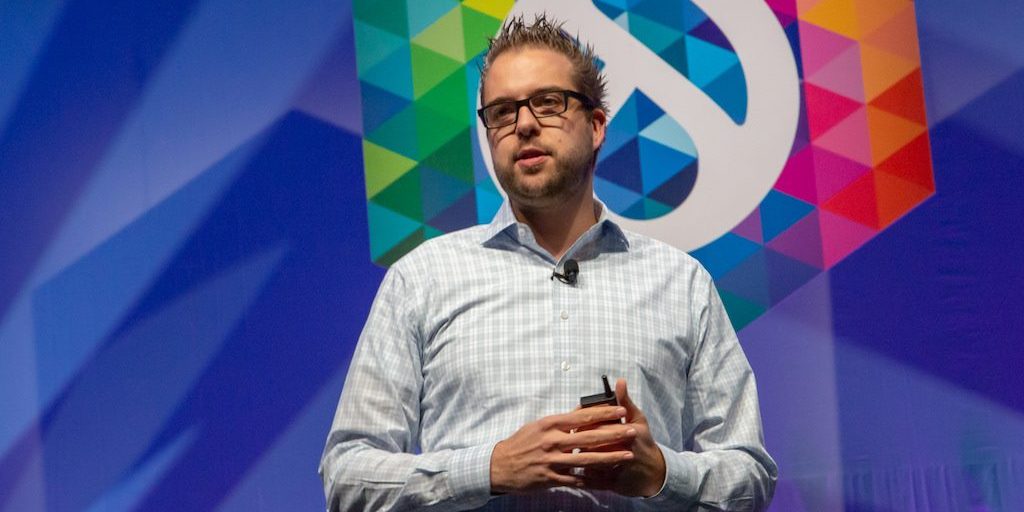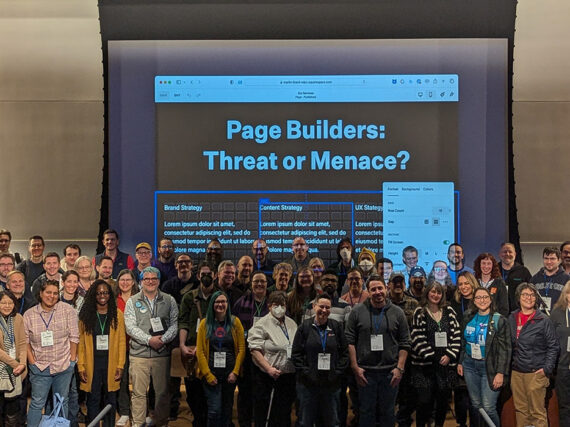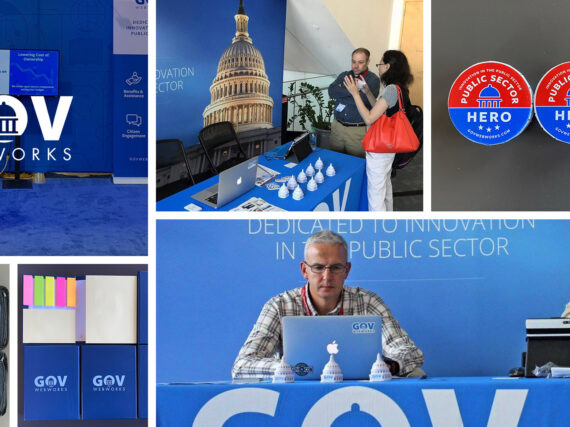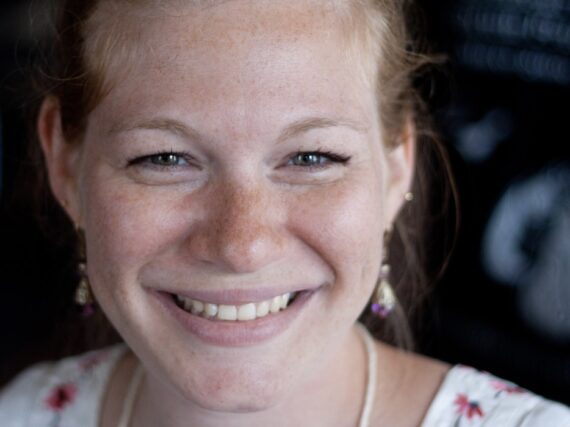As part of my first DrupalCon, I knew that I wanted to catch the opening keynote. There were a few reasons I was determined not to miss it.
First, I hoped I would learn more about where Drupal is heading this year. From coworkers and the Drupal newsletter, I knew I’d probably hear lots about technical improvements and initiatives that are underway. I figured I might also hear about broader themes in the community like improving the authoring experience. Lastly, I hoped I would gain a little insight into the man behind Drupal, Dries Buytaert (pronounced “trees” with a “D” “bah-tart”).
I’ll admit, I don’t keep up on his blog or social media, but I was curious to learn more about Dries and the greater community. Culture and values are inherently intangible. Even though I use and work with Drupal every day, I didn’t feel like I knew the whole story. So what could I learn about our platform, founder, and the community I’m increasingly a part of from the keynote? I am pleasantly surprised to say “quite a lot.”
Interestingly, Dries split his keynote into three sections that closely matched my own interests.
- “Drupal updates” on what’s cooking in the Drupal core kitchen came first
- “Growing Adoption” which touches on the more intangible things we’re hungering for in the community
- “Fostering the Community” where Dries spoke about how we can continue to strengthen our culture… and what our culture even is!
Drupal updates
There are a lot of exciting releases that have just happened or are coming soon. Migrate is stable and media is in core. Layout builder and the settings tray are here to make sophisticated editing and layouts a reality (without too much sorcery). The API-first initiative is yielding new stable options for truly headless Drupal. And the Out of The Box initiative gives us a beautiful, demo-able Drupal… and we don’t even have to make content for it!
What’s really interesting about these updates though is the why of them. These near-term roadmap (8.5-8.7) features are in support of three big goals:
- Ease of use for content creators
- Spend less time maintaining sites (or upgrading/migrating)
- Platform differentiators / longer term innovation
These goals also match patterns in what the community offered as feedback… surely no accident.
Growing adoption
The song may change, but the refrain remains the same…
Dries, the Drupal Association, and Acquia did a bit of data gathering: they asked the community what we could do better. What they found were some familiar patterns that cropped up again and again.
Improve the technical evaluation process
There’s a lot involved in the journey for a prospective Drupaler to become an active Drupal user. Those steps might typically look something like:
(Prospect) > Discovery -> Download -> Documentation -> Installation -> Trial > (Active)

The problem is, we focus very, very heavily on the active user… and all but ignore the earlier steps. Matthew Grasmick compared how many clicks it takes to go through this whole process compared to other frameworks. Drupal was an order of magnitude more clicks! No wonder people give up and we lose them. The actionable fixes are:
- Better discovery on drupal.org: the DA released a new home page!
- Better “getting started” documentation: the Documentation Working Group is on it
- Easy to access demo of what Drupal can do: Umami release in 8.6 as part of the Out of The Box initiative
- More modern admin experience: refresh to admin themes are coming. The JavaScript modernization initiative opens the door for longer term overhauls
Improve the content creator experience
While Drupal is highly functional, the content creation experience isn’t always the nicest. Dries points to a lot of our competitors who are making big strides in this area with easy-to-use, no-training-needed interfaces that are lovely to look at. As we can see from initiatives that are underway or recently released, a lot is happening in this area. The preponderance of talks at DrupalCon on this topic also highlights the focus our community is giving this issue!
Improve the site builder experience
While Drupal is incredibly powerful and allows site builders to do a multitude of things, there are still some pain points. Things we can do (and are doing) to make site builders’ lives easier could be summed up as “make Drupal Easy.” Config management is a huge improvement over manual setting syncing or features, but there’s still room for improvement. Composer is really powerful, but there’s still work to be done for contrib maintainers and making composer a better option (but not the only option). Keeping Drupal up to date is also a pain point currently, with short windows for updating. Making improvements to these are priorities for this year.
Promote Drupal to non-technical decision makers
When we got to this one, I all but jumped out of my seat cheering! As Dries noted, a lot of the people that make the call on which CMS to use are not technical people. “Techies” may love Drupal and open source, but that means a lot less (or means the wrong things) to others. What I hadn’t considered is that the make up of decision makers has changed over time. As websites have gotten bigger, more integral to a company’s success (or failure), more stakeholders are involved. We as a community don’t do a great job connecting with all those stakeholders. The Drupal Association is looking to hire someone to help coordinate the community’s PR efforts. The hope is that our efforts in “Selling Drupal” will look more like our efforts in “Building Drupal.”
So as we can see, a lot of these challenges have overlapping solutions. Not only are we taking a multifaceted approach, a lot of this work is underway already.
Fostering the community
This section of the talk was great to hear. Even if left to my own devices, I’d have been happy ending at the previous section. The reality is, this “mushy” stuff of values and principals isn’t my milieu. While I can appreciate it as valuable to write this stuff down, most of the time it seems stilted and a bit artificial. So it was a bit dubiously that I buckled in to listen to Dries talk about community values.
As it turns out, I think he probably feels the same as I do (as a lot of us do I imagine). Not only is it a little uncomfortable, it’s just plain hard to neatly button up something as intangible as the soul of a community. For the lifespan of the Drupal project, there’s never been a formal set of values written down. Dries talked about how hard it was to distill 17 years of learning, growth, and challenges into a few values. What he came up with is five core values, with several principals for each:
- Prioritize Impact
- Strive for Excellence
- Better Together
- Treat Others with Dignity and Respect
- Enjoy What You Do
Overall, these really resonate with me. If we do a good job living these values, it’s a community I’d be delighted to be a part of… and engage with! Rather than hear my interpretation though, I suggest you check out the full set of values and principals. These are currently in alpha (hey, we’re developers after all) and will change over time as the community reflects on them. As one principal says: change is constant.
So what did I really learn?
Did I get what I had hoped out of the Driesnote? Most definitely. After having some time to reflect, these are the big takeaways that stick in my mind:
1. We’re a community that’s obsessed with improvement. This is something that is near and dear to my heart, since it’s my tendency to never be satisfied as well. Perhaps so much so that I forget not all communities are the same! We’re always striving to be better, but that can come at a cost. It took hearing other speaker’s keynotes to remind me that we are actually a very special community. While Dries touched on this, it struck me that maybe we can be a bit too hard on ourselves sometimes. The side effect is that we can be disparaging and a bit depressed with the state of Drupal – seeing only faults, and glossing over strengths. It reminded me to pause and celebrate our successes before diving into our faults.
2. Drupal is a big part of our lives, and that’s why this community has staying power. Dries peppered his talk with stories of how Drupal was a part of people’s lives in ways big and small. We spend a lot of time surrounded by fellow Drupalers, and how we maintain and approach that culture is important. Even if it’s mushy non-technical stuff that we don’t like to talk about. Especially if it’s mushy stuff we don’t like to talk about.
3. Dries strikes me as someone who genuinely cares about this community. Now this is just a first impression and no one is perfect, but his love of this incredible space shone through brightly. I really enjoyed getting a chance to hear Dries talk about his own community, and the follow up Q&A was great too. I couldn’t help but feel that this is someone who wants to participate in, not dictate choosing Drupal’s direction. Dries is highly invested in – and even sometimes surprised at – the power of this community.
He also seems to prefer hearing the community’s ideas before fully formulating his own opinions. That’s something I respect and appreciate, and is all too rare in a culture of hero worship. Is that part of why Drupal has been successful for 17 years? Perhaps.
Finally
When I landed in Nashville I thought of myself as someone who uses Drupal. Somewhere between then and when I boarded my plane home, I decided I was a Drupaler. Today, I can’t wait to see what comes next for this amazing community.
Learn more
- DrupalCon Nashville 2018: Driesnote Video
- DrupalCon Nashville 2018: Flickr Photos
- Dries Buytaert Blog: Defining Drupal’s values and principles
Author bio
As a Software Developer, Caroline Casals spends most of her time in Drupal doing both back and front end dev. She also fills the roles of quality assurance tech, content strategist, and content migration lead. She enjoys helping clients fall in love with their site all over again.







